F-102A Delta Dagger
(Case X Wing)
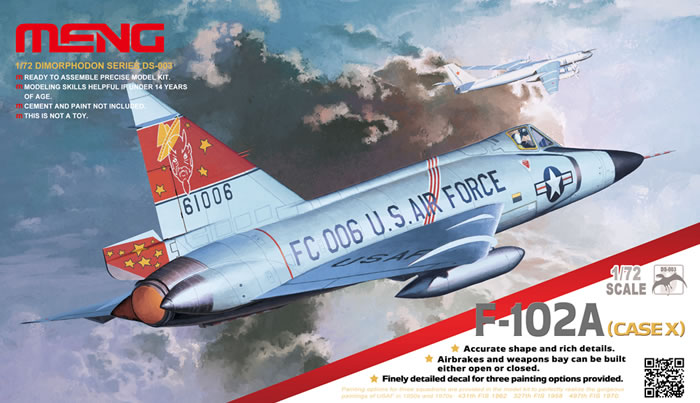
Meng Model, 1/72 scale
S
u m m a r y |
| Catalogue Number and Description: |
Meng Model Kit No. DS-003 - F-102A Delta Dagger (Case X) |
| Scale: |
1/72 |
| Contents and Media: |
95 parts in grey plastic and two parts in clear; markings for three aircraft. |
| Price: |
USD$21.99 plus shipping available now from Lucky Model
will be available from Hannants |
| Review Type: |
FirstLook |
| Advantages: |
Excellent mouldings; high level of detail; fine recessed panel detail; useful options incuding separate weapons bay doors, retracted or deployed rocket pylons and poseable air brakes; high quality decals with three colourful varied schemes. |
| Disadvantages: |
Black USAF lettering on decal sheet (most likely should be US Insignia Blue) |
| Conclusion: |
An excellent model. Highly Recommended. |
Reviewed by Brett Green

HyperScale is proudly supported by
Squadron
The Convair F-102 Delta Dagger was a US interceptor aircraft built as part of the backbone of the United States Air Force's air defences in the late 1950s.
Entering service in 1956, its main purpose was to intercept Soviet bomber fleets. The F-102 was the first operational supersonic interceptor and delta-wing fighter of the USAF. It used an internal weapons bay to carry both guided missiles and rockets. As originally designed, it could not achieve Mach 1 supersonic flight until redesigned with area ruling.
The F-102 replaced subsonic types such as the F-89 Scorpion, and by the 1960s, it saw limited service in Vietnam in bomber escort and ground attack roles. It was supplemented by F-101 Voodoos and, later, by F-4 Phantom IIs.
Many F-102s were transferred to United States Air National Guard duty by the mid-to-late 1960s, and the type was retired from operational service in 1976.
The follow-on replacement was the Mach 2 class F-106 Delta Dart, which was an extensive redesign of the F-102.*
Meng is a new company from China that produces both military vehicles and aircraft models. This is Meng’s third aircraft release, but its first operational subject following its 1/72 scale Kayaba ramjet fighter and Mansyu Ki-98 earlier this year.
Meng's 1/72 scale F-102 Delta Dagger is fitted with the Case X wing and comprises 95 parts in grey plastic and five parts in clear. Markings for three aircraft are also included.
Plastic parts are very well moulded with no imperfections in places that will be visible on the finished model. Even tricky areas such as the undercarriage doors and the backs of one-piece wheels are free from ejector pin and sink marks.
Panel lines and selected rows of rivets are quite crisp and fine. The photos tend to overemphasise them due to the saturation of light, but they look very good on the surface of the plastic.
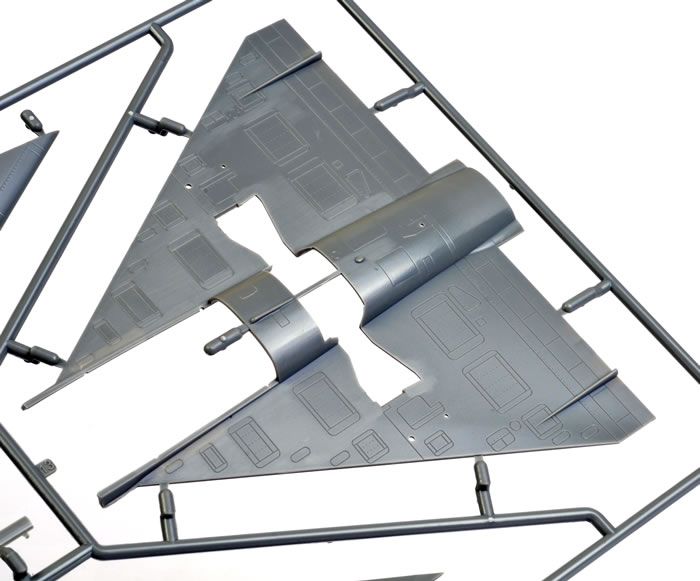
Details are also well done. The cockpit features an instrument panel with moulded detail and the option of a decal overlay. The seat is a three-piece affair, although you'll need to bring your own harness straps. The tub includes integrated side consoles with raised switch detail.
The engine exhaust is appropriatey deep and the two-piece nozzle is finely detailed.
The clamshell speed brakes may be posed either open or closed. If they are glued open, a one-piece actuator will hold the speed brake doors at the correct angle.
Landing gear bays have penty of structural detail moulded in place.
One of the most impressive options in the kit is the weapons bay. This may be posed open with a loadout of six AIM-4C or AIM-4D missiles. Alternate pylons are provided too - either folded or deployed.
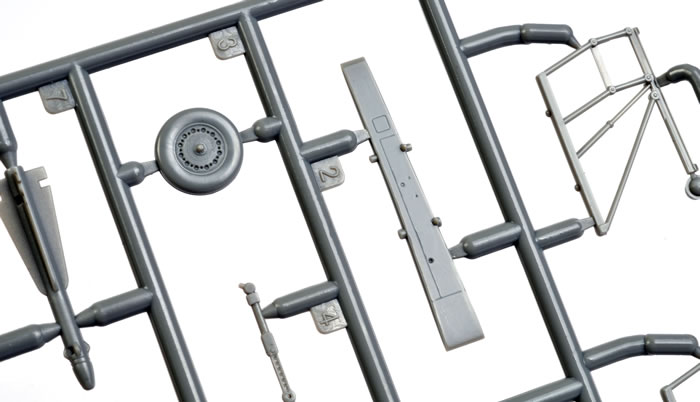
The folded weapons bay door is well detailed on both sides and even on the edges.
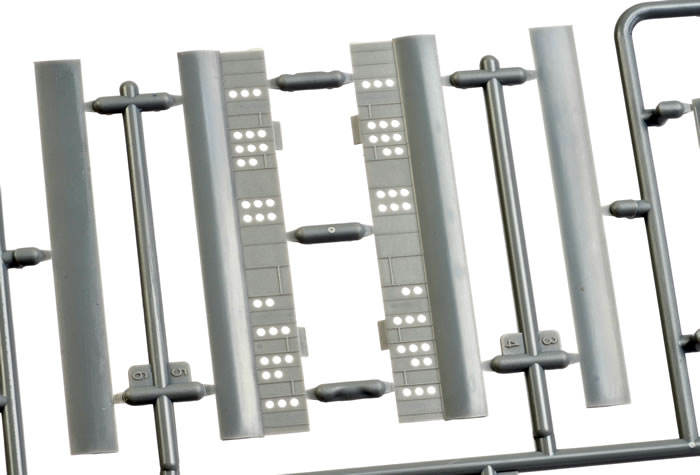
Two under-wing 815 litre drop tanks complete the ordnance.
The clear parts are thin and free from distortion. The canopy may be posed open using a fixed actuator - another thoughtful touch.
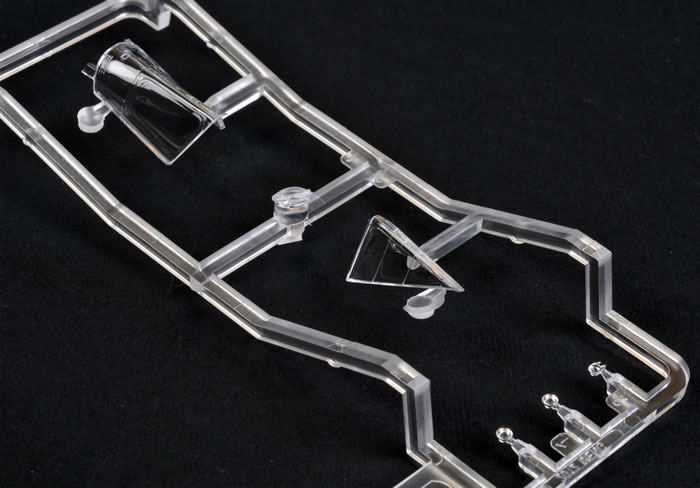
Engineering and parts breakdown is conventional, with thin sprue attachments and plenty of locating pins. On the major parts such as fuselage halves, the sprue attaches via the mating surface, not the exterior surface of the part. This reduces the risk of scarring the external surface of the plastic during parts removal and cleanup.
There is no mention of nose weight, but I expect that some will be required to keep that front wheel on the ground.
Markings are supplied for three aircraft:
-
431st Fighter Interceptor Squadron, 1962 finished in overall grey
-
327th Fighter Interceptor Squadron, 1958 finished in overall grey
-
497th Fighter Interceptor Squadron, 1970, finished in SEA colours of tan, green and dark green over grey.
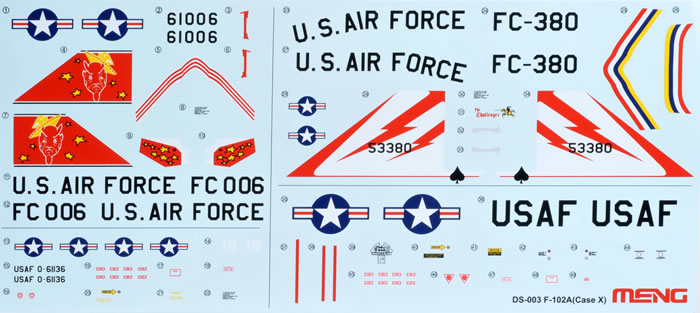
The markings provided for the two grey machines are colourful and interesting. The SEA scheme offers even more variety. The decals are well printed and in register. The only potential issue is the USAF and U.S. Air Force markings, which are supplied in black. I understand that these should be Insignia Blue.
.
Meng’s first two Japanese aircraft releases were technically very nice - well detailed with fine surface features - but their hypothetical nature may have limited their mass-market appeal.
This new 1/72 scale F-102 will find a much broader market. It blows away the old 1/72 scale Hasegawa Delta Dagger in terms of detail, options and surface features. In fact, I think it is the best F-102 kit currently available in any scale.
The model is surprisingly big, even in 1/72 scale, so it will be an eye-catching canvas for some of the striking marking options available.
This is an impressive model of an important Cold War early supersonic jet. I look forward to hearing about Meng's future release plans!
Thanks to Meng Model for the sample
* Background and History courtesy of Wikipedia

Text and Images Copyright © 2012 by Brett Green
Page Created 26 October, 2012
Last updated
26 October, 2012
Back to HyperScale Main Page
|
